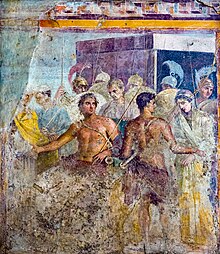Briseis
daughter of Briseus in Greek mythology
Briseis (Ancient Greek: Βρισηίς Brīsēís, 'daughter of Briseus'), also known as Hippodameia (Ἱπποδάμεια Hippodámeia), is a significant character in the Iliad. Her role as a status symbol is at the heart of the dispute between Achilles and Agamemnon that initiates the plot of Homer's epic. She was married to Mynes, a son of the King of Lyrnessus, until the Achaeans sacked her city, and was given to Achilles shortly before the events of the poem. Being forced to give Briseis to Agamemnon, Achilles refused to re-enter the battle.




Quotes edit
- Shall I release the Prize I gain’d by Right,
In taken Towns, and many a bloody Fight,
While thou detain’st Briseis in thy Bands,
By priestly glossing on the God’s Commands?
Resolve on this, (a short Alternative)
Quit mine, or, in Exchange, another give;
Else I, assure thy Soul, by Sov’reign Right
Will seize thy Captive in thy own Despight. - From thy own Tent, proud Man, in thy despight,
This Hand shall ravish thy pretended Right.
Briseis shall be mine, and thou shalt see,
What odds of awful Pow’r I have on thee:- Agamemnon to Achilles
- Homer, Iliad, I
- He said, and soon, obeying his Intent,
Patroclus brought Briseis from her Tent;
Then to th’ intrusted Messengers resign’d:
She wept, and often cast her Eyes behind;- Homer, Iliad, I
- John Dryden, tr., "The First Book of Homer’s Ilias"
- Fables, Ancient and Modern (1700)
- Briseis, fair as golden Venus, saw
Patroclus lying, pierced with mortal wounds,
Within the tent; and with a bitter cry,
She flung her down upon the corpse, and tore
Her breast, her delicate neck, and beauteous cheeks;
And, weeping, thus the lovely woman wailed:
“Patroclus, dearly loved of this sad heart!
When last I left this tent, I left thee full
Of healthy life; returning now, I find
Only thy lifeless corpse, thou Prince of men!
So sorrow still, on sorrow heaped, I bear.
The husband of my youth, to whom my sire
And honoured mother gave me, I beheld
Slain with the sword before the city walls:
Three brothers, whom with me one mother bore,
My dearly loved ones, all were doomed to death:
Nor wouldst thou, when Achilles swift of foot
My husband slew, and royal Mynês’ town
In ruin laid, allow my tears to flow;
But thou wouldst make me (such was still thy speech)
The wedded wife of Pêleus’ godlike son:
Thou wouldst to Phthia bear me in thy ship,
And there, thyself, amid the Myrmidons,
Wouldst give my marriage feast; then, unconsoled,
I weep thy death, my ever-gentle friend!”
Weeping, she spoke; the women joined her wail:
Patroclus’ death the pretext for their tears,
But each in secret wept her private griefs.- Homer, Iliad, XIX, 280–302
- Lord Derby, tr., The Iliad of Homer (1864)
- Captive Briseis in a foraign Tongue
More by her blots, than words, sets forth her wrong
And yet these blots, which by my tears are made,
Above all words, or writing should perswade.
Subjects (I know) must not their Lords accuse;
Yet prayers and tears we lawfully may use. - Then furl your Sails, once more your Anchors cast;
Leave not your Country, nor your Honour blast.
But go, or stay; with you I ought to move,
Made yours by Right of War, and Right of Love.- Ovid, Heroides, III
- John Caryl, tr., "Briseis to Achilles"
- Ovid's Epistles, Translated by Several Hands (London: Jacob Tonson, 1680)
- However much Briseis lay with her bottom turned towards him, the son of Aeacus found his beardless friend more congenial to his tastes.
- However much Briseis towards Achilles
Turned her white buttocks, fairer than twin lilies,
He found below the smooth Patroclus' waist
Enjoyment more congenial to his taste.- Martial, Epigrams, XLIII
- The Index Expurgatorius of Martial (1868), p. 85